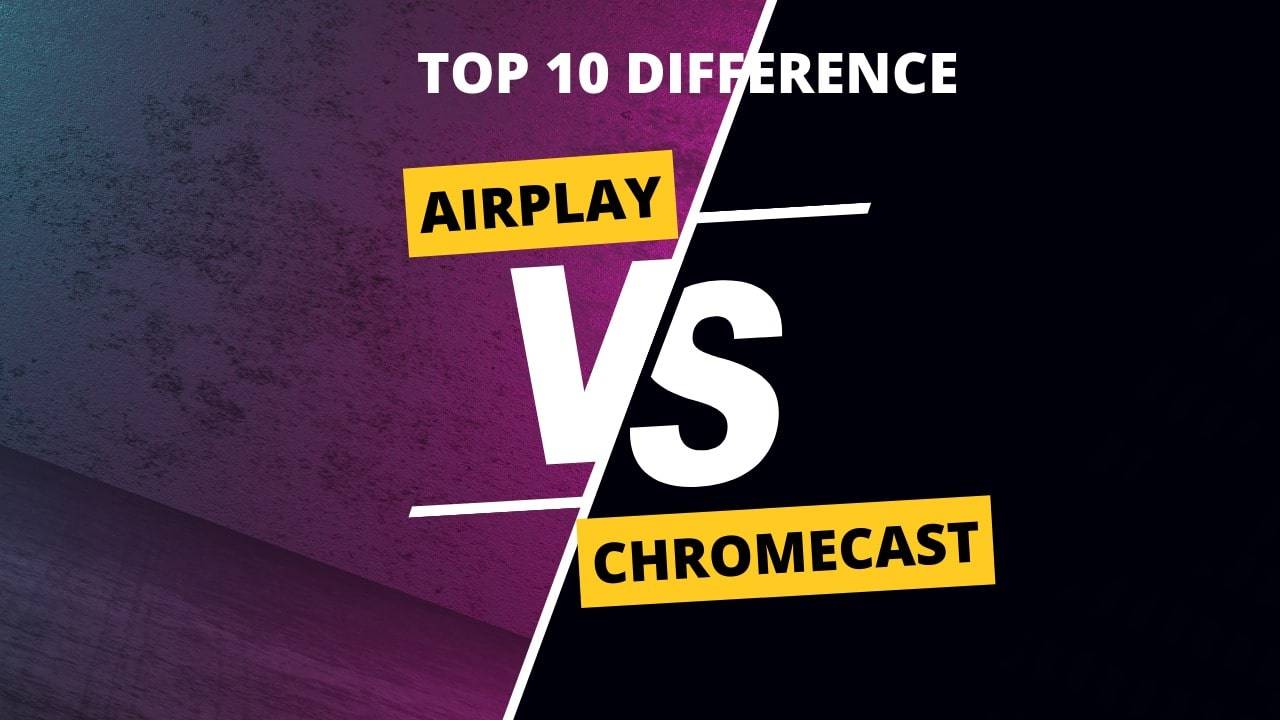I have shared details comparison between AirPlay vs Chromecast. You can find the best streaming way for your Android, iPhone, Windows, PC/Laptops. We have done comparisons on Streaming, Audio, Mirroring and plenty more.
Streaming media has become a vital component of our everyday life in the age of smart technology. With the rise of linked devices, two prominent streaming technologies have emerged: AirPlay and Chromecast.
Both Apple AirPlay and Google Chromecast provide fluid media streaming experiences. However, they vary in several ways, such as feature sets, ecosystem integration, and device compatibility. In this article, we will talk about the top 10 differences on AirPlay vs Chromecast.
Read more: Best Chromecast Audio Alternatives
AirPlay vs Chromecast
- The Adaptability of Devices: One of the most significant distinctions between AirPlay vs Chromecast is device compatibility. AirPlay is only available on Apple devices such as iPhones, iPads, and Macs, restricting its use to the Apple environment. Chromecast, on the other hand, supports a broader range of devices, including Android smartphones and tablets, iOS devices, Windows PCs, and even Chromebooks, making it a more adaptable option.
- Ecosystem Integration: With other Apple goods and services like iTunes, Apple Music, and HomeKit-enabled smart home appliances, AirPlay delivers seamless integration. Users can now easily stream entertainment from their Apple smartphones to AirPlay-enabled gadgets like Apple TVs and HomePods thanks to this integration. However, Chromecast allows users to cast media material straight from a variety of Google services, including YouTube, Google Play Music, and Google Photos, to Chromecast-compatible devices.
Read more:Best Free Chromecast Streaming Apps for Android - Streaming Techniques: Chromecast and AirPlay use several streaming technologies. Low-latency streaming is made possible by AirPlay since it relies on a direct peer-to-peer connection between the Apple device and the AirPlay-capable device. In contrast, Chromecast employs a receiver-based strategy in which the Chromecast device directly downloads and streams material from the internet. The less dependence on the user’s gadget, the more stable the streaming is made available.
- Mirroring the screen: Users may mirror the complete screen of their device onto a device that supports AirPlay via the screen mirroring capability offered by AirPlay. For presentations, gaming, or sharing multimedia from applications without built-in AirPlay compatibility, this functionality is very helpful. On the other hand, Chromecast does not provide native screen mirroring, although certain Android devices might already have this feature.]
Read more: Best Chromecast Alternatives - Support from Third-Party Apps: When it comes to third-party app compatibility, Chromecast has an advantage. Google has made an SDK (Software Development Kit) that allows developers to easily add Chromecast capabilities to their apps available. As a result, Chromecast is natively supported by several widely used streaming services, such as Netflix, Spotify, and Hulu. Third-party apps are supported via AirPlay as well, however, the degree of integration may not be as high as with Chromecast.
- Capabilities for gaming: Users of AirPlay’s “AirPlay Mirroring” gaming mode may use their iOS smartphone as a controller to play games on a bigger screen. This function is very popular among iPhone and iPad players. Chromecast, however, doesn’t have any capabilities specifically designed for gaming because it focuses largely on video streaming.
- Audio Streaming: With high-quality, noise-free sound transmission, AirPlay shines at audio streaming. Users may synchronize and play music on many AirPlay-compatible devices at once thanks to its capability for multi-room audio playback. In contrast to AirPlay, Chromecast also offers audio streaming, but it is unable to offer music lovers the same degree of fidelity.
- Voice Control: A crucial feature of contemporary smart devices is voice control. AirPlay integrates smoothly with Apple speech assistant, Siri, allowing users to manage media playing, volume, and other functions using voice commands. On the other hand, Chromecast works with Google Assistant, allowing users to manage media playing and do other activities by speaking.
- Device’s adaptability and cost: Chromecast has a clear advantage when it comes to price and accessibility. Compared to AirPlay-capable devices like Apple TVs, Chromecast devices are often more affordable. Furthermore, Chromecast devices are readily available in numerous retail outlets, making them more accessible to a wider audience.
- Data Privacy and Collection: Because of their separate parent industries, Chromecast and AirPlay have different privacy risks. Apple is famous for taking a stand for consumer privacy and emphasizing data security. In contrast, Google business strategy is based on gathering data to improve user experiences and advertise to specific audiences.
Read more: How Do I Get Peacock on my TV
Conclusion
Finally, for media streaming, AirPlay vs Chromecast each provide unique features and functions. While Chromecast offers more device compatibility and significant third-party app support, AirPlay enables seamless integration inside the Apple ecosystem. The decision between the two is influenced by user preferences, device ecosystems, and intended usage. Users may choose wisely and have a good streaming experience by being aware of these distinctions.
Leave a Reply